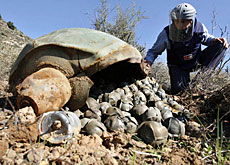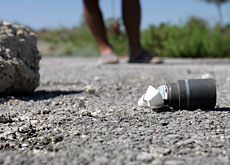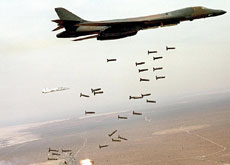Swiss targeted over cluster bombs stance

The non-governmental organisation Handicap International has criticised Switzerland's position on cluster bombs, as a key conference on the issue gets underway.
It said Switzerland had adopted an “ambiguous” standpoint by supporting a partial moratorium on cluster bombs, and called on the country to implement a full ban.
The three-day conference in Peru, which starts on Wednesday, is aimed at broadening support for an international declaration banning cluster munitions by 2008.
This was initiated by 46 nations in February in Norway. Switzerland was among those to sign up and it is expected to send a delegation to the Peruvian capital, Lima.
Countries have also been urged to take steps at a national level before the treaty takes effect. Switzerland’s neighbour Austria has already announced a full moratorium on cluster munitions.
But at the beginning of May – in answer to a parliamentary question – the Swiss government said it favoured a partial moratorium, saying a full one was “excessive”.
This would effectively apply to the production, stockpiling, transfer and use of such weapons which present a strong threat to humans.
Handicap International’s Swiss section has slammed the move as ambiguous and a “balancing act”.
“[The government] proposes a ‘partial moratorium’ in the expectation of a ‘partial ban’ and thus leaves the door open to maintaining the county’s arsenal of cluster bombs which it already has,” it said in a statement on Tuesday.
Handicap International said this did not fit with the government’s stated desire to strengthen its role in negotiations for the treaty.
Swiss bombs
According to the NGO, Switzerland possesses around 200,000 cluster bombs for use in the event of invasion.
Cluster bomblets are packed by the hundreds into artillery shells, bombs or missiles that scatter them over vast areas, with some failing to explode immediately.
Unexploded bomblets can then lie dormant for years after conflicts end until they are disturbed, often by civilians. These weapons have recently been used Iraq, Kosovo, Afghanistan and Lebanon.
The United Nations estimated that Israel dropped as many as four million bomblets in southern Lebanon during last year’s war with Hezbollah, with as many as 40 per cent failing to explode on impact.
According to Handicap International, cluster bombs of the type M85, which are the ones stockpiled in Switzerland, were used in Lebanon.
The NGO is therefore calling for Switzerland to support a full ban on cluster munitions. A parliamentary initiative calling for such a ban is due for discussion next month.
swissinfo with agencies
No international treaty, including the Geneva Conventions, specifically forbids the use of cluster bombs.
However, the Geneva Conventions outline laws protecting civilians during conflict. Because cluster bomblets often cause civilian casualties after conflicts end – much like landmines – their use has been heavily criticised by human rights groups.
In Switzerland, parliament will discuss a ban on the weapons in June after an initiative put forward last year by a Radical member of the House of Representatives, John Dupraz. The Swiss army has 200,000 such weapons.

In compliance with the JTI standards
More: SWI swissinfo.ch certified by the Journalism Trust Initiative


You can find an overview of ongoing debates with our journalists here. Please join us!
If you want to start a conversation about a topic raised in this article or want to report factual errors, email us at english@swissinfo.ch.